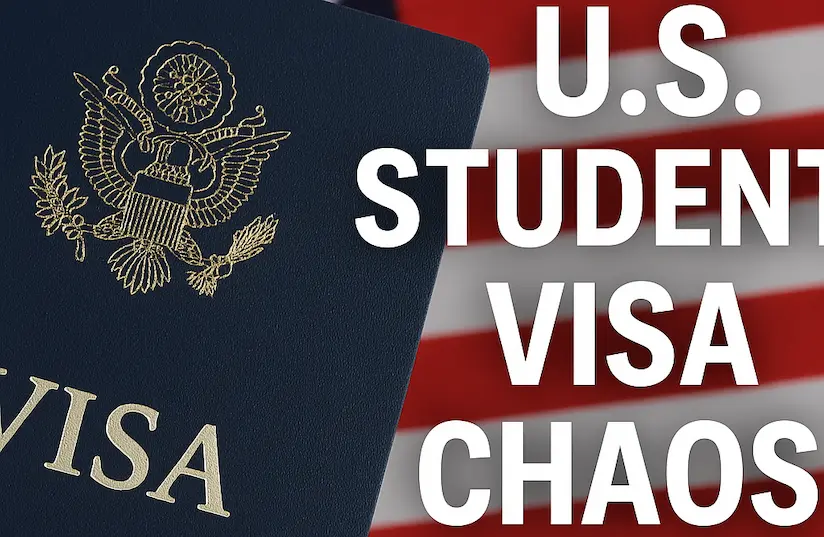
This change could have far-reaching consequences, affecting universities, global education trends, and individual students' ability to pursue degrees in the U.S
A Sudden Disruption for International Students
US Student Visa Chaos – The United States has long been a top destination for international students pursuing higher education. However, the latest move by the Trump administration to pause new student visa interviews has sent shockwaves through the global academic community. With expanded social media screening and heightened national security concerns, students worldwide are facing unexpected delays and uncertainty about their academic future in the United States.
This change could have far-reaching consequences, affecting universities, global education trends, and individual students’ ability to pursue degrees in the U.S.
Why Has the U.S. Halted New Student Visa Interviews?
The recent State Department directive, issued under Secretary of State Marco Rubio, has instructed embassies worldwide to stop scheduling new student visa interviews until further notice. While students who already have appointments can proceed, no new interview slots are being allocated.
This policy shift is reportedly driven by several key factors:
The expansion of social media screening is one of the primary reasons behind this decision. The Trump administration plans to increase vetting of students’ online activity, scrutinizing platforms like X (formerly Twitter), Facebook, TikTok, and Instagram for content related to national security risks. Officials claim that terrorism concerns and antisemitic content have become growing threats in academic circles.
Another major factor is the crackdown on campus activism. The administration argues that some students enter the U.S. under student visas but participate in radical protests, influencing domestic politics. Recent pro-Palestinian demonstrations at Ivy League universities have drawn federal attention, with some students facing visa revocations and possible deportation.
Additionally, there are broader national security concerns influencing visa policies. Officials claim that foreign student admissions must be more strictly regulated to prevent misuse of U.S. resources, unauthorized research access, or politically motivated actions within educational institutions.
These justifications for halting student visa processing have caused a stir among universities, international students, and education advocates, raising concerns about the future of foreign academic exchanges in the U.S..
Impact on International Students and Universities
The student visa interview freeze has thrown thousands of applicants into uncertainty, particularly those preparing for the upcoming fall semester in U.S. institutions.
For International Students:
Students who had planned to attend U.S. universities in 2025 now face significant delays, with visa approvals becoming increasingly unpredictable. Many are worried about the consequences this could have on their education, future job prospects, and financial commitments.
Visa applicants also now have to undergo stricter social media scrutiny, meaning their online activity—including past political posts, discussions, and even personal opinions—could be analyzed. Immigration officers will assess content for potential security risks, making it essential for students to review their digital footprint.
Students who have already secured visas but are involved in activism or protests could also be at risk. Reports suggest that some international students participating in controversial demonstrations on U.S. campuses have received warnings about potential visa revocations and deportation orders.
For U.S. Universities:
Academic institutions are facing significant financial losses, given that international students contribute over $44 billion annually to the U.S. economy. Many universities depend heavily on foreign enrollments to maintain funding for research programs, faculty salaries, and campus operations.
Elite institutions like Harvard, Stanford, and MIT are taking a stand against visa restrictions, warning that tightened policies could discourage top talent from applying to U.S. schools. Harvard has even filed a lawsuit against the Trump administration, arguing that targeting international students undermines American competitiveness in global education.
With international applications in decline due to policy uncertainties, Canada, Australia, and the United Kingdom are emerging as alternatives for students who once considered the U.S. their top choice. The shift in global student preferences could result in U.S. universities losing long-term prestige and academic dominance.
Trump’s War on Elite Universities and International Students
Former President Donald Trump has openly criticized Ivy League institutions, accusing them of promoting radical ideologies and allowing foreign students to influence U.S. political movements.
The recent visa freeze and screening expansion appear to be part of his broader campaign against elite universities, particularly Harvard, which has been involved in legal battles over government funding restrictions.
The Harvard lawsuit aims to challenge the Trump administration’s attempts to revoke visa privileges and cut federal grants. The university argues that these policies violate academic freedom and create a hostile environment for international scholars.
Furthermore, the Trump administration’s recent executive orders on restricting visas for students involved in political activism have raised ethical concerns. Some advocacy groups fear that these policies are not just about security, but about silencing dissent and controlling intellectual discourse in American institutions.
Conclusion: What’s Next for U.S. Student Visas?
The halt on student visa interviews and stricter screening procedures represent one of the most dramatic shifts in U.S. immigration policy for international students.
With universities pushing back through legal battles, and thousands of students facing uncertainty about their academic futures, the ongoing debate will shape the future of global education in America.
If the Trump administration continues tightening restrictions, more international students may turn to Canada, Australia, or Europe for higher education, leading to a potential decline in U.S. academic influence worldwide.
The world is watching, and for thousands of aspiring students, the dream of studying in the U.S. remains hanging in the balance.
Read – Bitcoin Kidnapping Horror: Second Suspect William Duplessie (28) Surrenders in SoHo Torture Case
2 thoughts on “US Student Visa Chaos: Trump Administration Halts New Interviews & Tightens Screening”